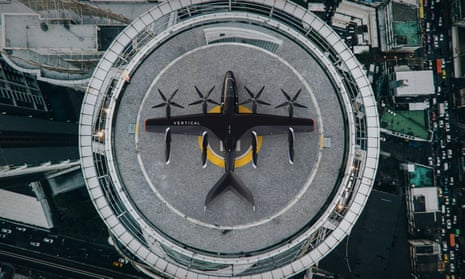A UK startup that makes flying taxis is to float on the New York stock exchange as Virgin Atlantic and American Airlines placed orders for as many as 1,000 of its prototype electric aircraft.
Vertical Aerospace, which is based in Bristol, said its electric vertical takeoff and landing aircraft (eVTOL) could be in service by 2024, once safety regulators certify it. Developers believe eVTOLs will transform urban transport, offering on-demand flights in and between cities more quietly, cheaply and safely than helicopters.
Vertical Aerospace said its VA-X4 model, priced at roughly $4m (£2.8m), is zero emissions and near silent, able to carry four passengers and a pilot more than 100 miles and travelling at more than 200mph.
The aircraft leasing company Avolon will be the biggest launch customer, with a conditional order for as many as 500 aircraft valued at $2bn. Virgin Atlantic has options to buy 150, with a view to establishing a branded network in the UK. American Airlines has placed a conditional order for as many as 250 and will work on similar infrastructure in the US.
Vertical Aerospace plans to float after merging with Broadstone, a special purpose acquisition company (Spac), with a value of $2.2bn. Stephen Fitzpatrick, best known as the founder of Ovo Energy, set up Vertical Aerospace in 2016.
He said: “This is the most exciting time in aviation for almost a century. Electrification will transform flying in the 21st century in the same way the jet engine did 70 years ago. Today’s announcement brings together some of the largest and most respected technology and aeronautical businesses in the world, and together we can achieve our aim of making the VA-X4 the first zero-carbon aircraft that most people will fly on.”
Vertical Aerospace has also formed strategic partnerships with firms such as Honeywell and Rolls-Royce, and Microsoft is among its other investors.
Shai Weiss, the chief executive of Virgin Atlantic, said the airline would be exploring a joint venture “to bring short-haul, electric vehicle connectivity to cities and our UK airport hubs, starting with London Heathrow as well as Manchester and London Gatwick”.
The aircraft could be used to transfer passengers between home and airports, Virgin believes. It would be able, for example, to make the 56-mile journey from Cambridge to Heathrow in 22 minutes, compared with a 90-minute drive.
The announcement represents another step in the race to making mass electric flight and air taxis a reality. Some analysts have predicted the sector could be worth £150bn by 2040 but significant hurdles remain, including regulation and safety certification. The VA-X4 has yet to take its first test flight.
Dómhnal Slattery, the chief executive of Avolon, said its order would “accelerate the inevitable commercial rollout of zero-emissions aircraft. Before the end of this decade, we expect zero-emission urban air mobility, enabled by eVTOLs, to play an increasingly important role in the global commercial aviation market.”
Vertical Aerospace’s Munich-based rival, Lilium, also announced a tie-up with Honeywell this week to provide the avionics for a seven-seater EvTOL it hopes will be in service by 2024.
Vertical Aerospace’s announcement marks the latest example of corporate investors using Spacs to grow companies. Another such deal was announced on Friday with Wiggle, the Portsmouth-based online cycle retailer, being bought by the German firm Signa and merging with Yucaipa, a Spac, for listing on the US stock market as part of a $3.2bn deal.
